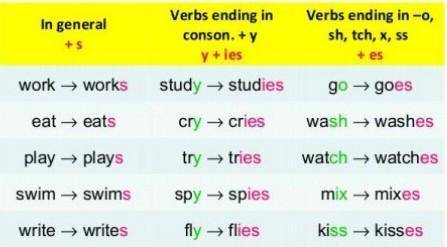
English, 23.02.2021 18:50 swaggg2084
RECUERDA QUE EN PRESENTE SIMPLE CUANDO HABLAMOS DE EL O ELLA (HE/SHE) EN EL AFIRMATIVO VA EL VERBO CON S Y EN EL NEGATIVO USAMOS DOESN´T MAS EL VERBO PERO SIN LA S
ABAJO ESTA EL CUADRO EXPLICATIVO DE LOS CASOS EN QUE CAMBIAN ALGUNAS TERMINACIONES.
-CUANDO LA LETRA ANTERIOR A LA “Y” ES CONSONANTE CAMBIA A “IES”
- CUANDO EL VERBO TERMINA EN CH/SH/O/S/X SE LE AGREGA “ES”
-VERBO HAVE PASA A “HAS”
COMPLETA LOS ESPACIOS CON LA FORMA CORRECTA DE LOS VERBOS.
Peter (1) _STARTS_ (start) his day at 7.oo. He (2) _ (have) breakfast in the kitchen with all the family. Each member (3) _ (fix) his own breakfast. Peter (4) _ (like) orange juice, toast and milk. He always(5) _ (have) an apple: his mother (6)_ (believe) “an apple a day (7) _ (keep) the doctor away”. After breakfast Peter (8) _ (make) his bed and (9) _ (tidy) up his bedroom. He (10) _ (get) ready for lessons. He mustn’t be late, mother (11) _ (be) very strict.
At 8.00 the Hanson kids (12) _ (start) their lessons. At midday they (13) _ (have) lunch. Then it’s sport time: they (14) _ (love) playing basketball, in-line staking and skate-boarding. After a refreshing shower the Hanson brothers (15) _ (rehearse) till dinner, because their fans (16) _ (be) very demanding: they (17) _ (want) every detail to be OK.
Peter and his brothers (18) _ (not/have) dinner with their parents as their father is always late. Their mother (19) _ (not/like) it very much. So, at weekends they (20) _ (be) always together.
Mary (1) _WAKES_ (wake) up at 7.00. Then she (2) _ (get) up at 7.30 and she (3) _ (go) to the bathroom. She (4) _ (have) a shower, (5) _ (brush) her teeth and (6) _ (comb) her hair. Afterwards she (7) _ (have) breakfast. Ten minutes later she (8) _ (take) her satchel, (9) _ (kiss) her mother and (10) _ (catch) a bus to school with her friend Diana. They (11) _ (start) school at 9.00. They (12) _ (not/have) lunch at the school canteen. At three o’clock they (13) _ (return) home.
In the afternoon, she (14) _ (study) her lessons and (15) _ (ride) her bicycle. In the evening she (16) _ (help) her mother prepare the dinner. After dinner she (17) _ (watch) TV, her mother (18) _ (read) a magazine and her father (19) _ (go) to bed earlier since he (20) _ (be) always the first in the family to get up.
ayudaaa


Answers: 3


Other questions on the subject: English


English, 22.06.2019 01:30, helpsos8028
Why was kennedy concerned about the use of nuclear weapons
Answers: 1

English, 22.06.2019 02:00, kris22elizondop9v1bb
What is the effect of narrator's word choice on the tone of this passage? the words "my heart shrank within itself" create a fearful tone. the words "wounded his fellow" develop a remorseful tone. the words "struck harsh upon my ears" suggest an irritated tone. the words "better-omened" set a hopeful tone. excerpt from "the cabuliwallah" by rabindranath tagore i was sitting in my study, looking through the accounts, when some one entered, saluting respectfully, and stood before me. it was rahmun the cabuliwallah. at first i did not recognise him. he had no bag, nor the long hair, nor the same vigour that he used to have. but he smiled, and i knew him again. "when did you come, rahmun? " i asked him. "last evening," he said, "i was released from jail." the words struck harsh upon my ears. i had never before talked with one who had wounded his fellow, and my heart shrank within itself when i realised this; for i felt that the day would have been better-omened had he not turned up.
Answers: 3

English, 22.06.2019 06:30, jenlopezx3710
The limerick and the tongue twister are two types of verse. a) nonsense b) articulation c) declaration d) interrogation
Answers: 1
You know the right answer?
RECUERDA QUE EN PRESENTE SIMPLE CUANDO HABLAMOS DE EL O ELLA (HE/SHE) EN EL AFIRMATIVO VA EL VERBO C...
Questions in other subjects:













